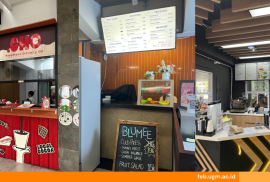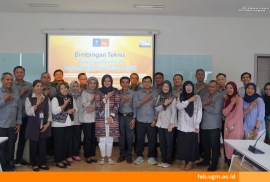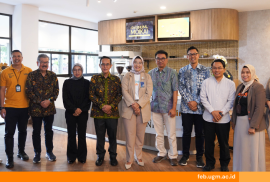In developing the carbon market in Indonesia, the Financial Services Authority (OJK) plays a crucial role in supervising and regulating carbon trading through the Carbon Exchange. In his presentation at the National Green Economy Seminar at the Learning Center Building FEB UGM on Friday (08/11/2024), I Made Bagus Tirtahayatra, Head of the Department of Special Examination, Derivative Financial Supervision, Carbon Exchange and Securities Transactions at OJK RI, explained carbon trading and OJK’s role in it.
I Made explained that the carbon trading ecosystem in Indonesia involves three main parties. First are the participants, which include companies, project developers, corporations, financial institutions, and intermediaries. Second is the primary market, which is directly related to the issuance of securities, where all data and information are recorded in the national registry system (SRN-PPI). Third is the secondary market, which the OJK supervises through the Indonesian Carbon Market (IDXCarbon).
There are different roles between the OJK and the Carbon Exchange. The OJK is responsible for regulating the secondary trading of carbon instruments on the Carbon Exchange and providing OJK regulations related to developing carbon-based activities or products. Meanwhile, the Carbon Exchange is responsible for developing carbon trading infrastructure, issuing regulations related to the Carbon Exchange, data exchange and integration with SRN-PPI, conducting carbon trading, and developing activities and products based on carbon units.
“OJK has long been known as a financial services regulator, but it now has the authority to regulate secondary trading in the carbon market and to issue relevant OJK regulations. Therefore, OJK’s current responsibilities include issuing licenses related to the carbon exchange and institutions in the secondary market and monitoring transactions,” he explained.
After one year of operation, the Indonesian carbon market has recorded transactions amounting to 904,793 tCO2e with a transaction value of Rp 50.45 billion. Currently, 91 companies are registered in the carbon market. These figures still need to be added to Indonesia’s total carbon trading potential. However, achieving the maximum potential of carbon trading in Indonesia still faces many challenges, such as OJK’s limited authority in the secondary market, an underdeveloped carbon market ecosystem, limited products on the Carbon Exchange, lack of understanding of the Carbon Exchange by industry players, and the lack of comprehensive implementation in the carbon economic value ecosystem.
Indonesia’s carbon market can reach the international market, carbon taxes can be applied in Indonesia, and derivative products based on carbon units can be developed. Creating a green business ecosystem will bring Indonesia closer to the 2060 net zero emissions target.
Reportage: Najwah Ariella Puteri
Sustainable Development Goals













